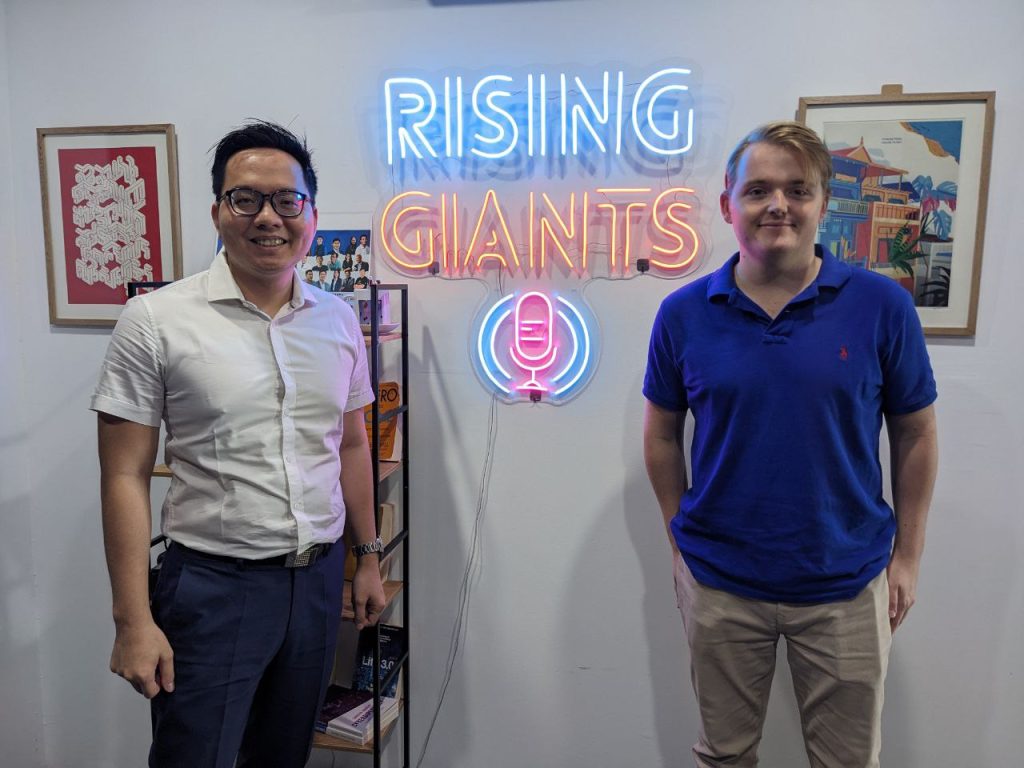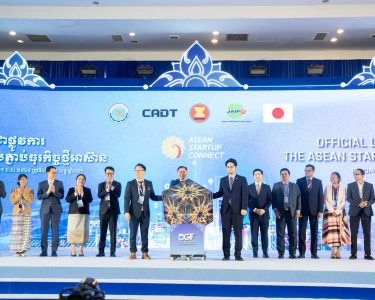Cambodia Investment Review
In episode 106 of the Rising Giants podcast hosts Max Thornton and Dom Kalousek sat down with Lydet Pidor founder of Tech for Kids Academy and President of The British Chevening Alumni Association of Cambodia, shedding light on his experiences with entrepreneurship, education, and the rapidly developing EdTech sector in Cambodia.
Opening the conversation, Lydet shared his personal experience applying for the British Chevening Scholarships fully-funded by Foreign Commonwealth and Development Office (FCDO) through the British Embassy in Cambodia.
Read more: E105 – Christophe Forsinetti on Navigating Cambodia’s Emerging VC Space
Lydet advised aspiring scholars to carefully consider how their field of study aligns with their long-term career and leadership ambitions. He also emphasized the importance of understanding the time commitment involved, noting that many applicants may need to temporarily step away from their current jobs, which can be a difficult decision to make.
Reflecting on his own educational journey in the United Kingdom, Lydet noted that the experience was a 180-degree turn from his humble upbringing in Cambodia. He stated that education in the UK required a lot of self-study and class preparation. Despite the classes being fewer in number, Lydet mentioned that they were intensive and required considerable reading to fully participate in class discussions.
He also noted that his education at the University of London exposed him to Environmental, Social, and Governance (ESG) impact investing. This experience allowed him to interact with some of the leading minds in business, inspiring him to consider how impact investing could benefit Small and Medium Enterprises (SMEs) in Cambodia.
In entrepreneurship ‘ideas are inexpensive, but execution is costly’
Speaking about entrepreneurship, Lydet delved into his early startup ventures in Cambodia around 2016, describing the challenges he faced in an ecosystem that was still in its nascent stages. He disclosed that one of his startups was a ride-hailing app aimed at solving the problem of bargaining with tuk-tuk drivers in Cambodia. The venture, however, never took off, mainly because all co-founders had too stable jobs with reliable salaries. He also spoke about another startup that aimed to assist agricultural farmers in controlling pests. The startup developed a sound system to lure pests into traps, which would later be prepared as food for local villagers. However, they couldn’t find the right sound expert to fulfill their technical needs.
Looking back, Lydet felt that they had missed their opportunity, especially in light of the subsequent success of similar platforms like PassApp. He emphasized that one of the common issues they faced was the lack of a driving vision for the startup. He also noted that ideas are inexpensive, but execution is costly. A clear shareholders’ agreement and co-founders’ commitment levels are critical for success.

Lydet further elaborated that he has taken these lessons to heart in his new ventures, stressing the importance of honest feedback and transparent intentions among co-founders. He believes that openness is crucial for the long-term success of any company. Quoting a cliché he holds dear, he said, “The moment you are afraid of something, you should do it.” He explained that this attitude is essential for better communication and mutual understanding among team members, especially in both good and stressful times.
On the positive side, he highlighted the importance of collective problem-solving, as well as understanding the root cause of issues through hard conversations. Lydet mentioned that it’s crucial to adapt your strategies to overcome obstacles such as economic downturns and the COVID-19 pandemic. He added that companies should hire and reward people based on their capabilities rather than strictly adhering to the Cambodian cultural norms of age and educational qualifications.
Bridging the gap in technology and entrepreneurship education
Turning to his latest venture, Tech for Kids Academy, Lydet shared that the academy aims to bridge the gap in technology and entrepreneurship education for Cambodian students aged 6 to 18. Currently, the academy is collaborating with both public and private schools and has already impacted around 3,500 students across the kingdom.
Their goal is to elevate school students to have the same digital capabilities as university students. When asked about the challenges, especially on the EdTech side, Lydet cited the difficulty in integrating their courses into the school curriculum and convincing parents about the long-term benefits of technology education over basic IT classes. To address this, he said they market their programs as long-term investments rather than short-term costs for parents and schools.
Discussing the competitive landscape, both locally and regionally, Lydet remarked that what sets his startup apart is its focus on building an educational ecosystem. He observed that many companies fail to adapt their content to local contexts and needs.
The EdTech space, according to him, has evolved rapidly over the last five years, shifting from a phase where people questioned the necessity of technology education to a phase where people are keen to invest in it. Looking ahead, Lydet believes that in the next 3 to 5 years, there will be a rapid uptake of this form of education, with governments realizing the need to adapt educational systems to the changing technological landscape.
Closing the podcast, Lydet shared some personal habits that help him stay focused and balanced, such as walking and reading, which he found especially beneficial due to the public spaces available in the UK. He said that most people often misunderstand his friendly demeanor, not realizing the stark difference between his personal and business mindset.
When asked who he would like to have coffee with, Lydet chose Benjamin Franklin from the Western world and Cambodia’s famous monk, Samdech Chuon Nath, from the local context. He ended the conversation by emphasizing that the most crucial advice he can give is to “do your best” and let the results speak for themselves.





